Top 7 Platforms That Speed Up Supplier Search


Procurement operations are often inefficient, spending hours or even days on each supplier search.
But what if you had quick and accurate sourcing, freeing up valuable time for other critical tasks?
Well, this blog post will explore seven powerful platforms designed to significantly speed up your supplier search process.
We’ll explore their key features, weigh the pros and cons of each, and empower you to choose the perfect tool to streamline your procurement efforts.
Let’s start off with Veridion, our advanced, AI-driven supplier sourcing enablement platform providing businesses with accurate and up-to-date supplier data.
With a massive database of over 120 million suppliers globally—updated every week—Veridion offers unparalleled coverage, dwarfing all of the other solutions on our list.
Plus, our intuitive APIs make utilizing this wealth of data simple, ensuring that your supplier search duration and quality of results are significantly improved.
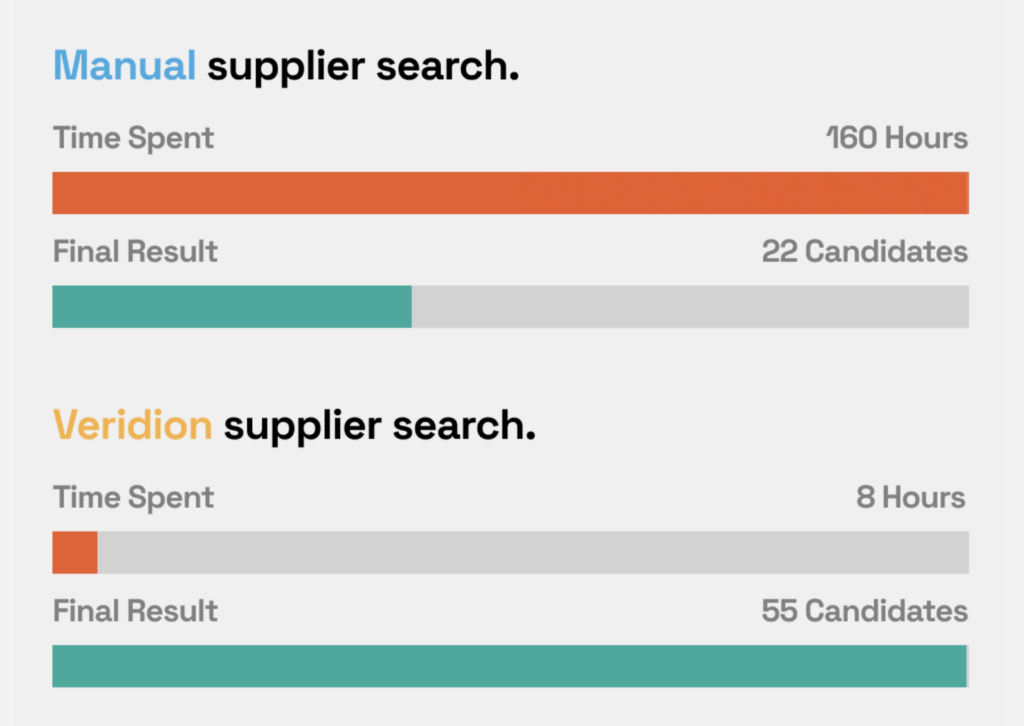
Source: Veridion
In fact, with our Search API and Match & Enrich API, you can easily find new vendors or enhance your existing supplier profiles with the latest data available.
Plus, the supplier data is extremely granular, offering over 80 data points per supplier, including location details, financial performance, and detailed ESG metrics for sustainable sourcing.
Our ESG data is only matched by highly niche platforms like Supplier.io that specialize in supporting supplier diversity initiatives.
Key Features:
For even greater ease of use, Veridion offers Scout, a natural language search tool that simplifies the supplier discovery process.

Source: Veridion
With Scout, you can directly list out your needs and requirements in plain language without the need for complex search filters and our AI-enabled system will find the most relevant suppliers for your needs.
| Pros | Cons |
|---|---|
| Enhanced supplier discovery | Data source variability |
| Extensive supplier database updated every week | Integration complexity |
| AI-powered features | |
| Customizable data solutions |
When it comes to pricing, Veridion offers a startup program that provides €30,000 in free credits for up to three months for businesses just starting out.
As for other pricing details, contact the Veridion team to discuss your requirements and discover how this powerful supplier intelligence platform can transform your procurement processes.
Alibaba is one of the largest global B2B platforms, connecting buyers with suppliers worldwide.

Source: Alibaba
While its supplier database of 200,000+ suppliers is small relative to some of the other platforms on our list, it offers a large product catalog with over 200 million products across 5,900 product categories.
These include different consumer goods, business services, manufacturing equipment, and even vehicle parts and accessories.
Key Features:
It’s worth mentioning that while Alibaba claims its suppliers are from over 200 countries worldwide, most ones you’ll encounter on this platform are based in China.
So, if you’re looking for a truly global supplier search, you should consider providers like Veridion or even SourceReady if your niche is consumer goods.
Alibaba also offers optional production monitoring and inspection services aimed at reducing manufacturing and product quality risk.
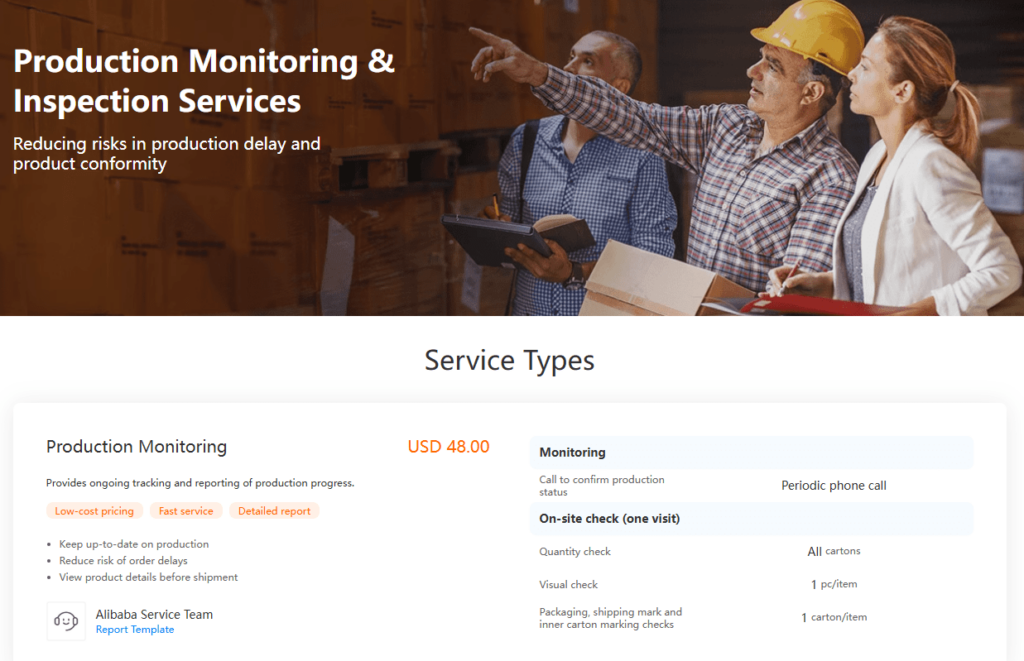
Source: Alibaba
But despite features like this one, along with Alibaba’s Trade Assurance and supplier verification for buyer protection, supplier reliability and quality vary for most other listed vendors.
| Pros | Cons |
|---|---|
| Access to a vast network of suppliers | The quality of suppliers can vary |
| Facilitates international trade | Potential language barriers |
| User-friendly interface | Risk of counterfeit products |
| Complex import procedures |
For buyers, Alibaba is free to use to search for products and connect with suppliers; however, any transactions made through the platform come with fees ranging from 3% upwards.
In summary, if you are willing to accept more supplier risk, Alibaba is a great low-cost platform for finding suppliers.
Third on our list is Thomasnet, a provider focusing specifically on the North American market, with a comprehensive directory of over 500,000 suppliers and more than 6 million products.
This platform primarily caters to the industrial business niche, encompassing various product and service categories within manufacturing, engineering, and related sectors.
Key Features:
A unique aspect of Thomasnet is that it’s completely free for buyers.
You simply navigate to their supplier search page and look for vendors based on product or service categories, utilizing filters for certifications, location, and other relevant criteria.

Source: Thomasnet
Also, you can search for CAD (Computer-Aided Design) models, with over 10 million 2D and 3D CAD drawings available on the platform.
This is particularly valuable for businesses looking for specific components or parts based on precise design specifications.
Once you’ve identified the best vendors for your needs, Thomasnet streamlines the RFQ process seamlessly.

Source: Thomasnet
Overall, Thomasnet is a valuable, albeit niche, platform for sourcing within North America.
But, if your procurement needs extend to a global scale, a more comprehensive platform like Veridion might be necessary.
| Pros | Cons |
|---|---|
| Focus on industrial and manufacturing sectors | Doesn’t cover a wide range of industries |
| Verified supplier information | Limited reporting features |
| Efficient RFQ process |
Still, given its free access, there’s no risk in exploring Thomasnet further, either as a standalone search tool or in combination with other more advanced platforms on our list.
Fourth on our list is SourceReady, an AI-driven platform designed to streamline the process of connecting businesses with suppliers.
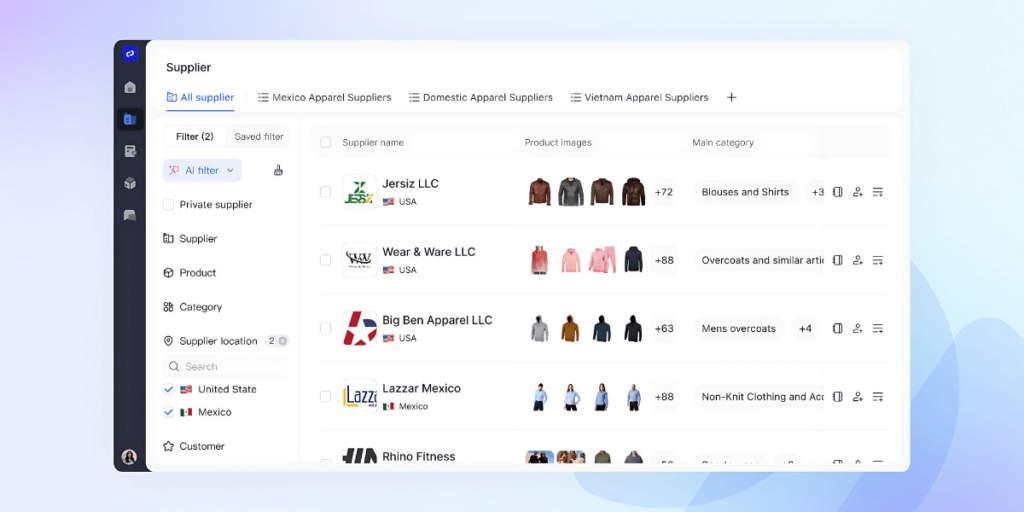
Source: LA Wire
It offers a relatively small database, comparable in size to platforms like Thomasnet, with over 600,000 verified suppliers across 30 countries.
The database is accessible through supplier searches that use 20+ filters, such as region, category, capability, size, MOQ, and more.
Key features:
SourceReady strongly emphasizes unbiased sourcing—not accepting paid listings or promotions and relying entirely on its AI-driven sourcing insights.
In fact, AI is what really makes this provider stand out, with a suite of features like their AI Product Creation.
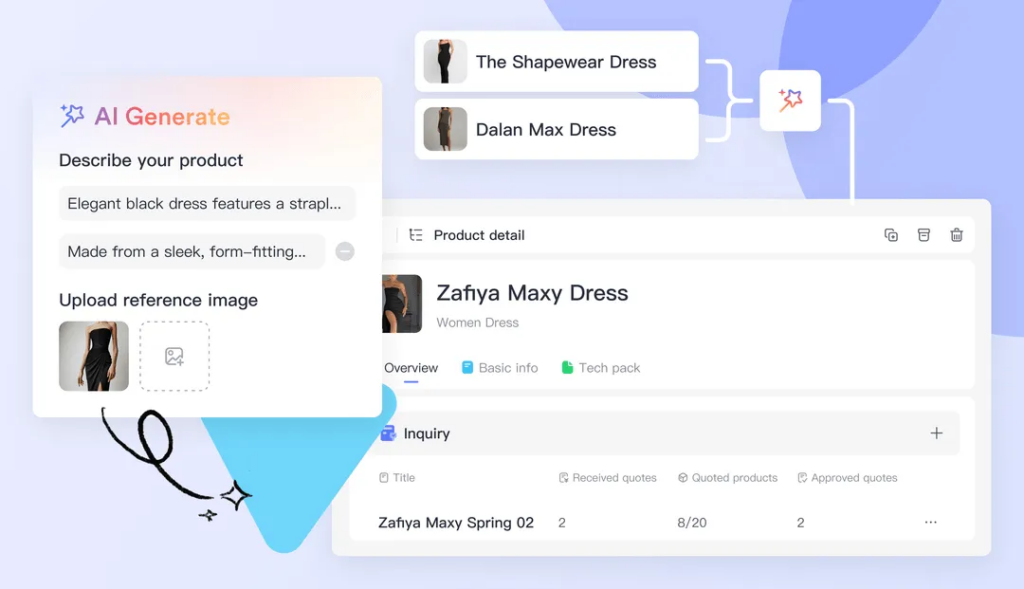
Source: SourceReady
With this tool, you only need to give the AI assistant your product preferences—such as color, size, or textures—or even include reference images, and the AI will search for the closest matching products and suppliers.
As you can see, the platform is best utilized by businesses sourcing consumer goods, such as apparel and footwear, jewelry, consumer electronics, and so on.
| Pros | Cons |
|---|---|
| AI-enhanced features and optimizations | Limited industry and product category coverage |
| User-friendly interface | Less in-depth coverage for European suppliers |
| Affordable pricing | Dependence on AI accuracy for supplier discovery |
SourceReady offers three pricing plans: Free, Entry ($36/month), and Basic ($186/month), each providing different levels of access, credits, and features.
Overall, if you are in the consumer goods industry and looking for powerful AI optimizations, this system is worth trying out.
Supplier.io distinguishes itself as a leading platform dedicated to fostering diversity and inclusion within supply chains.
It boasts a database of over 10 million suppliers globally, primarily small, diverse, and sustainable enterprises, with over 1 million records updated monthly.

Source: Supplier.io
Unlike other platforms on our list, Supplier.io occupies a unique niche.
In fact, while platforms like Veridion offer detailed ESG data, this provider goes further with specialized features tailored for diversity-focused procurement.
Key Features:
For instance, the Market Analyzer feature is a powerful tool for assessing supplier diversity within a given market. It aggregates and analyzes data from multiple sources, providing valuable insights into suppliers’ diversity profiles.
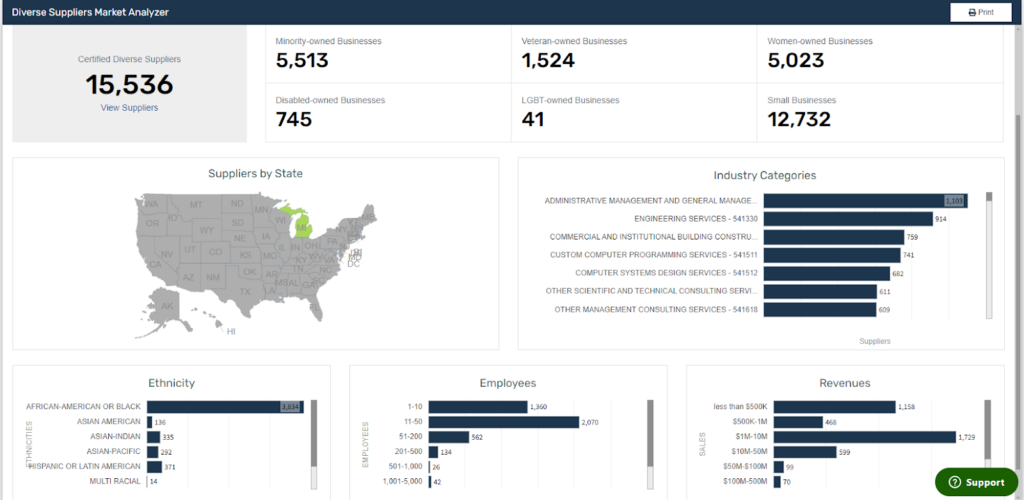
Source: Supplier.io
This data can be filtered by factors such as location, NAICS commodity code, industry, company size, and diverse business classifications, helping pinpoint opportunities for supplier diversification.
Combined with the equally robust Supplier Explorer and a data enrichment service, Supplier.io provides a full suite of tools to build and manage a responsible supply chain.
| Pros | Cons |
|---|---|
| Enhances supplier diversity programs | Limited supplier search scope |
| Provides comprehensive sustainability data | Subscription costs may be high for small businesses |
| Supports compliance and reporting | The mobile experience could be improved for better usability |
| User-friendly interface |
When it comes to pricing, it is based on the specific services required and is available upon contacting the sales team.
In short, Supplier.io is a great platform for sustainability-focused teams committed to building a diverse supply chain.
GEP SMART stands out as an all-in-one procurement platform with a wide range of functionalities, from sourcing and spend analysis to supplier relationship management.
While systems like Veridion and Supplier.io excel at providing extensive supplier databases with sourcing and data enrichment capabilities, GEP SMART focuses on unifying the entire procurement process.
When it comes to supplier search, GEP SMART offers dedicated Supplier Sourcing solutions.

Source: GEP SMART
However, the scope of search is limited to 10,000+ vendors across multiple countries.
Standout features include Should-Cost Modeling, which helps determine fair and reasonable costs for products or services based on factors such as raw material cost, manufacturing processes, and other cost drivers.
Or, there are functionalities like Real-Time Auctions, which create a competitive bidding environment among multiple vendors, and help companies secure favorable costs.
Other key features include:
These features are powerful individually, but GEP SMART’s true strength lies in its ability to unify these and many other capabilities in a single platform.
But, it’s worth noting that this comprehensive approach can sometimes lead to increased difficulty navigating the system.
| Pros | Cons |
|---|---|
| Comprehensive end-to-end procurement solution | May require significant training for optimal use |
| AI-driven insights for better decision-making | Customization can be complex and time-consuming |
| Enhanced collaboration between procurement and suppliers | |
| Tailored solutions to fit specific business needs |
As for pricing, it’s highly dependent on the specific needs of the organization and the scope of features and solutions you’ll use.
So, if you’re a large organization that can navigate GEP SMART’s complexity and needs a truly unified system, we recommend exploring this system further.
Finally, we have DeepStream, a digital procurement platform powered by DeepAI.
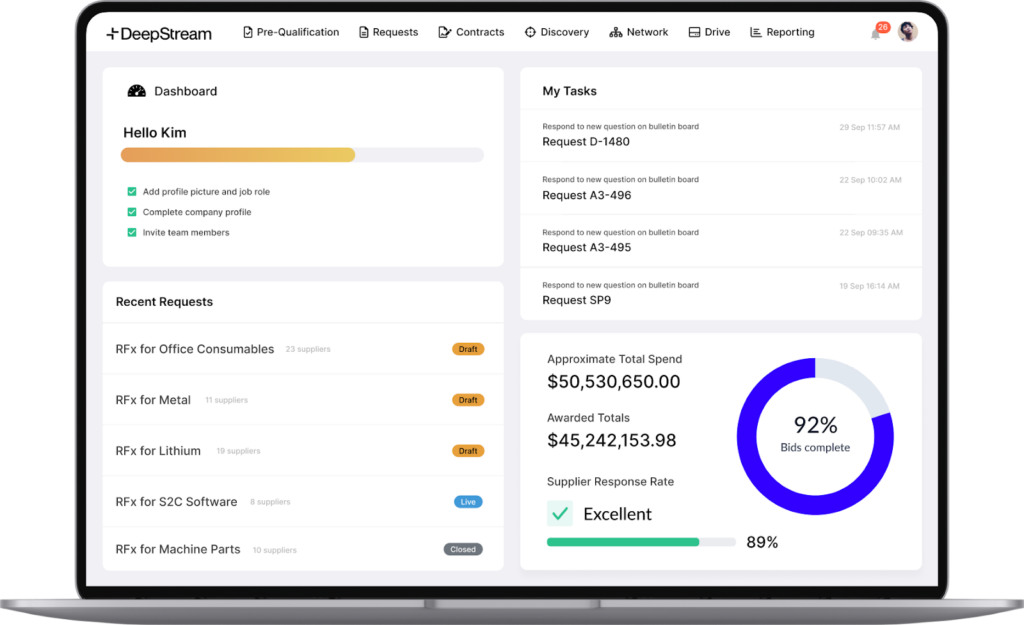
Source: DeepStream
This system essentially combines an intuitive AI-powered supplier discovery tool with a suite of features for buyer and supplier collaboration, including:
When it comes to their AI search feature, you can query the AI system using natural language, with criteria like location, product, and service specifications.
You can even include other suppliers you’d like to find similar ones to, or certain ones to exclude from the results.
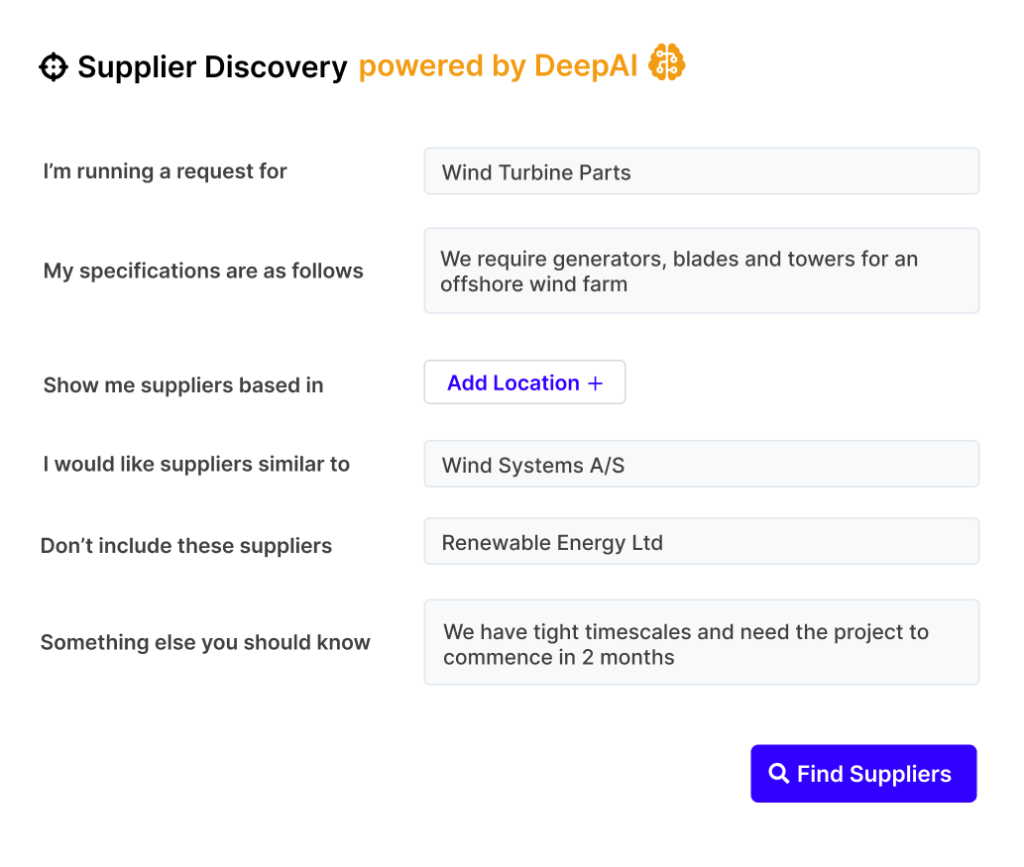
Source: DeepStream
For comparison, this supplier search feature is similar to Veridion’s Scout solution, with the exception being that we have less information on DeepStream’s depth and breadth of supplier data.
In any case, suppliers discovered through the platform can be easily managed and onboarded through automated pre-qualification questionnaires and integrated RFx features, streamlining the entire process.
| Pros | Cons |
|---|---|
| User-friendly interface | Notifications system could be improved |
| Comprehensive support | Lacks integrations with other ERP systems |
| AI search is straightforward | Unclear how much the system relies on in-house supplier network vs online AI searches |
| Users praise automation capabilities |
In terms of pricing, DeepStream has two paid tiers: one for basic supplier discovery and an advanced plan that unlocks its more in-depth supplier management features.
Overall, DeepStream is worth looking into for those looking for an AI-first platform with straightforward supplier management and collaboration capabilities.
We’ve covered seven diverse platforms in this blog, each with its own strengths and ideal use cases.
Whether you need a massive global database, specialized industry focus, or even free supplier search tools, there’s a solution out there for everyone.
By exploring these options and considering your specific needs, you can significantly improve your procurement process and start finding better, more suitable vendors.
So, take the next step and explore the platforms that resonate with your requirements—you might be surprised at how much time and effort you can save.